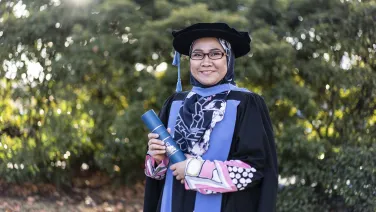A new star is born
"I always loved astronomy - I don’t remember a time when I didn’t!" says Raquel Salmeron. But Raquel’s path to the stars wasn’t direct. One of her earliest memories of astronomy was of her mother reading her a story that mentioned the Planet Earth. Raquel remembers pondering the concepts of a planet and the Sun, and her life long curiosity was piqued.
"In my home country, Venezuela, astronomy wasn’t a study option so I did aeronautical engineering instead, which I also enjoyed. Later, I discovered that the skills I had learned could be applied to astrophysical research, so I decided to give it a go and applied to do a PhD."
Now a research fellow with the Research School of Astronomy & Astrophysics, Raquel spends her time trying to understand how stars and planets are born. "My research involves constructing physical and computational models of how new stars are born from the gas that collects in vast space clouds called nebulae."
Exploring the physical processes that drive the formation of new stars, Raquel tries to understand the delicate balancing act between gravity pulling the spinning mass of nebular gas and dust towards the protostar, and magnetic forces flinging it back out into space. "I work with these models so that they gradually include more and more of the complex physics we think takes place during star formation. I love it!"
There is no such thing as an average day for Raquel. "There are days that are very busy with meetings, deadlines, talks - all very invigorating and high paced," she says. "I also love the days that I have no commitments so I can try out new things and ponder why things are the way they are. But the best days are when I discover a surprising result, or develop a new model. I’m excited about what I am going to find out."
On top of her own research, Raquel also spends time teaching undergraduate courses in physics and mathematics. "I find it very rewarding. I can answer their questions and hopefully inspire them towards a career in science."
In the future, Raquel hopes to continue with her research and to learn more about the magnificent universe we live in. "Science is about dreaming, being curious and wondering about the world around us. I am surprised and humbled where my science career has taken me," admits Raquel. "I live a privileged life. I love what I do."

